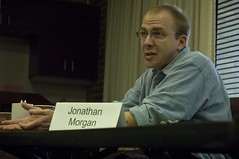
Michigan
newsrooms
Don't call it retirement, a Detroit reporter learned and shared:
"Don't relegate me to the trash bin that quickly," he said, snapping at a reporter for possibly the last time. "There's still some life in me."Still, I never did find any farewells to folks who recently left The Detroit News in the News. Fortunately, others did tell us about the 10 journalists fired in May - financial reasons, not employee problems.
Bill Shea talked to Charlie Cain, who ended a 34-year journalism career - the last 18 as the Detroit News' Lansing Bureau chief. It's a bathroom remodeling job and freelancing that unexpectedly will fill Charlie Cain's summer.
On Blogging for Michigan, Cain's firing was called "another nail in the Detroit News coffin."
A Lansing news magazine wrote about his firing as the lead-in to "Capitol news coverage dying."
(That article also looks at how coverage of the legislature has dwindled to two pay-only services.)
The 22 trimmed at the Detroit Free Press are highlighted in a Richard Prince Journal-ism column. He noted 15 of the journalists out at the Detroit Free Press are women, six African American, two Hispanic and two are Asian American.
That number includes columnist Desiree Cooper, who said goodbye in "With faith, miracles can still happen." and posted it in her new Detroit Diary.
Prince also said those leaving included editorial writer Nichole Christian, and Fred Fluker, and Martin Westman, both graphic designers; "Laura Varon Brown, Audience editor and columnist, who responded to readers' questions about the paper; Javan Kienzle, part-time copy editor; Christy Arboscello, a reporter who is Asian American, who resigned in May; Emilia Askari, an Asian American reporter who was part time; Dan Cortez, a part-time reporter who is Hispanic; part-time reporter Kim North Shine; part-time copy editor Amy Butters; Janice Monarrez and Julie Armstrong, part-time Web editors; Paul Barrett and Bernie Czarniecki, sports agate editors; and Rodney Curtis, assistant photo editor.
Prince also named three who resigned to save positions: Morgan Phillips, a full-time designer; Robin Payne, a part-time editorial research assistant who is black, and Robert Ellis, a full-time copy editor.
Askari, 49, told Journal-isms she has a scholarship to get a two-year master's program at the University of Michigan's School of Information, where she'll concentrate on social computing or human-computer interactions.
Christian told Prince she's trying T-shirt design and Web consulting.
Zachary Gorchow is leaving the Detroit Free Press to return to Gongwer News Service to edit the Michigan Report early next month, according to a July 2 Gongwer Report. There's more about the former State News managing editor at the college newspaper's alumni site.
Another hello to Lisa Allmendinger, who has freelanced for the closing Ann Arbor News and will now report for the weekly Ann Arbor Journal.
And one more column that came through the Muskegon Chronicle but is actually from the Los Angels Time: "Stone's story holds lessons for today's newspeople." D.D. Guttenplan asks and then answers:
How did a 44-year-old man, who was almost completely deaf, reinvent himself as what many contemporary observers call the "first blogger."
























